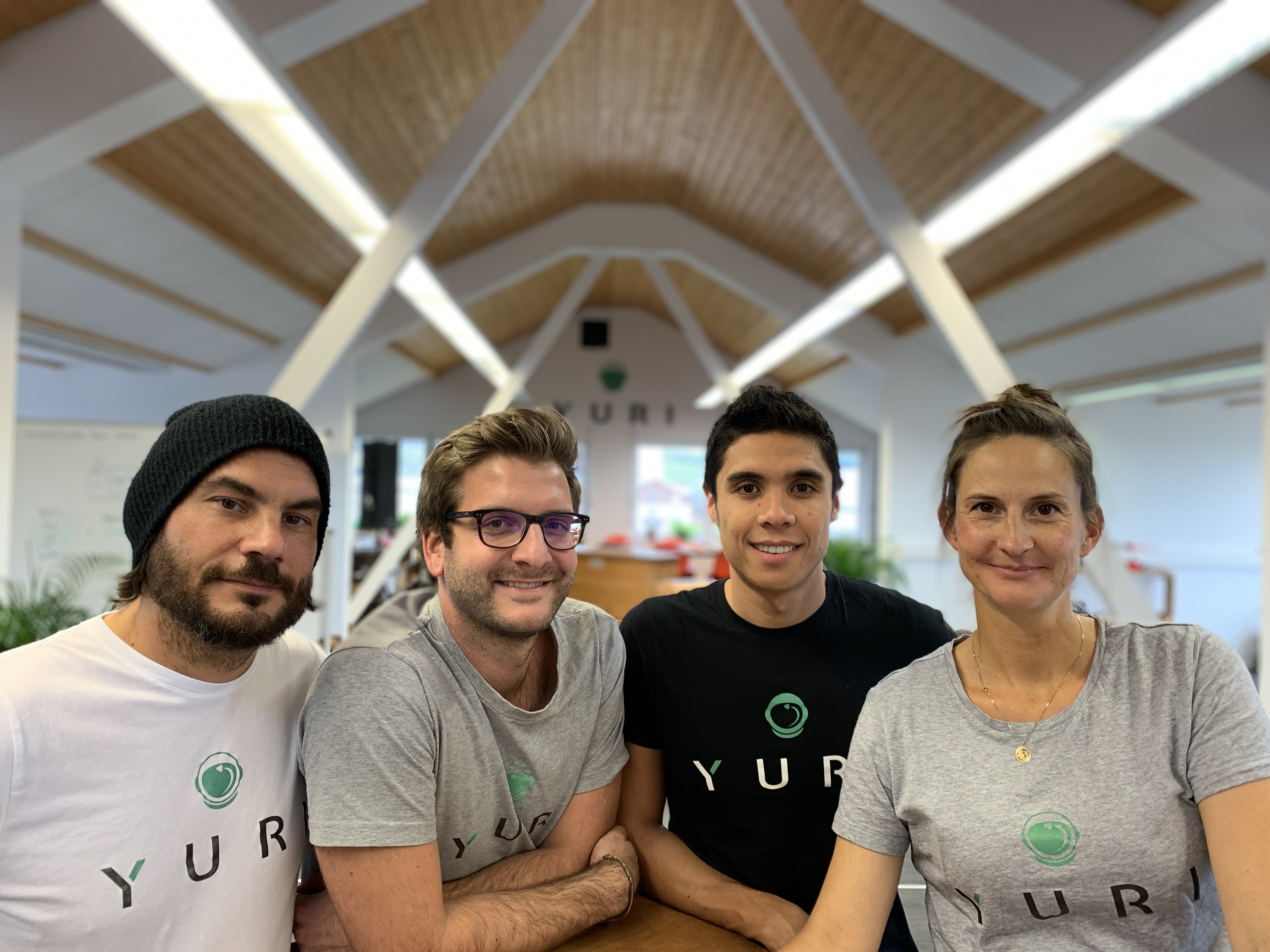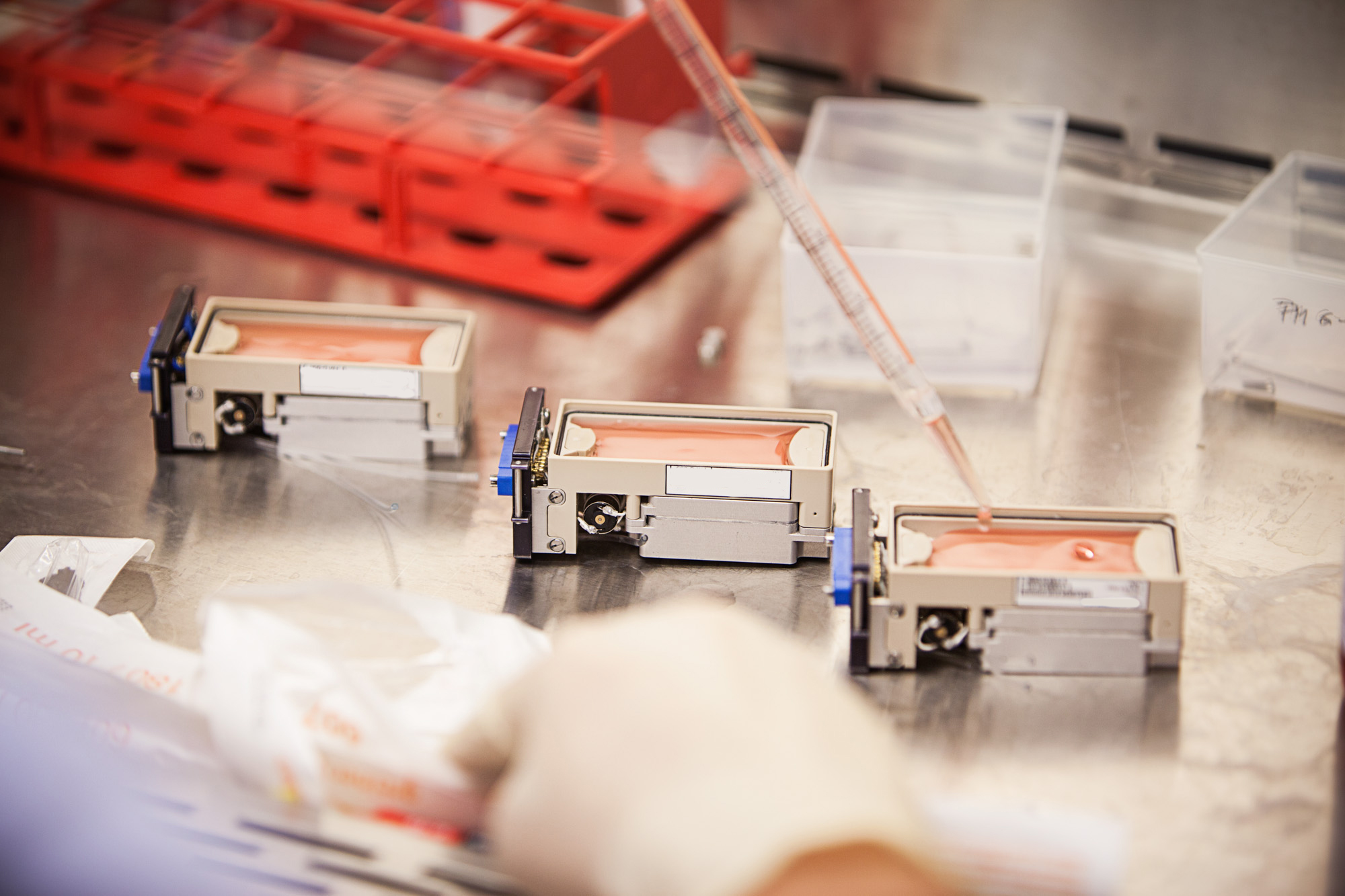Material research
Reaching up into weightlessness – a start-up that enables commercial research experiments in space
Yuri, a start-up company founded in 2019 in the Lake Constance area, is aiming high. The company’s mission is to enable microgravity research into the development of materials, new medicines and vaccines, including research opportunities on the International Space Station (ISS). Yuri’s tailor-made solutions are faster and more affordable than previous space research missions.
Many scientific findings are only achievable when experiments are performed under microgravity conditions. Space research is therefore the driving force behind many innovations in areas such as medicine, biotechnology, material science and microelectronics. Microgravity research facilitates the development of more conductive materials and better medicines because it is not subject to interfering influences. Yuri GmbH is a start-up founded by three aerospace engineers, Maria Birlem, Christian Bruderrek, Philipp Schulien and technology manager Mark Kugel in Meckenbeuren in summer 2019 to enable this kind of research.
The start-up idea – research lifts off
"Near weightlessness opens up completely new perspectives," explains the company’s chief commercial officer, Mark Kugel. "For example, fibre optic cables and human tissue are easier to examine and manufacture than on Earth." But there is a catch: because access to weightlessness is a lengthy and expensive process, many research ideas frequently come to nothing. The start-up company yuri GmbH fills this vacuum and simplifies the process by intelligently managing formalities and people from the start of the process right through to the flight, using special hardware and platforms. This makes access to space research considerably easier, faster and more affordable. Yuri provides a service for space companies as well as pharmaceutical companies, research institutes and SMEs. "We pool several experiments in one mission in order to reduce space travel costs. We can also reduce research time to six months. The bottom line is that we can carry out an ISS research mission for 100,000 euros instead of a million euros, which is what it previously cost." Kugel, 29, studied innovation and entrepreneurship at the Technical University of Munich, before going on to found two start-ups. He has a great deal of experience in innovation and agility, and has supported the digital transformation of a number of companies. Together with his co-founders, he is now sending experiments on parabolic flights and space capsules as well as to the International Space Station (ISS).
The lightness of being – weightlessness as the basis for research
But how does the start-up do all of this? "We have developed a reusable box that is around ten cubic centimetres in size, and is a kind of miniature laboratory. We show researchers how to use it to set up their experiments in the box on a small scale." For experiments carried out on the ISS, ideally, the astronauts would simply put the research boxes on an experiment platform and the experiments would run automatically.
 The yuri Gmbh founders. © Yuri GmbH
The yuri Gmbh founders. © Yuri GmbHYuri benefits from a wealth of expertise: Maria Birlem, the company’s CEO, Christian Bruderrek and Philipp Schulien all studied aerospace engineering and worked as engineers at Airbus. Whilst working at Airbus, the yuri founders founded the internal brand "kiwi" under which they launched nine missions to the ISS, for customers such as the US space agency NASA, the European Space Agency ESA and the German Aerospace Center DLR. Was this a potential business idea? "We saw that demand for space experiments was growing and the huge interest in new and promising research approaches. As a small, private company, you can be far more flexible than large corporations. Yuri offers the hardware in the form of modular experiment boxes for analysing the effects of weightlessness on certain objects." A broad range of objects can be tested under microgravity conditions, including materials, cells and plants that are placed in appropriate research boxes and carried on board flights.
"We develop tailor-made solutions for our clients’ particular research approaches," explains Kugel. "The amount of experimentation required and the level of weightlessness to which the sample needs to be exposed determine where the experiment will be carried out." There are several possible scenarios. The simplest are drop-tower experiments or parabolic flights, in which scientists can even accompany their experiments during the 20-second "fall to the ground". A longer duration of microgravity can be achieved with suborbital space flights, in which a rocket is launched to the edge of space at an altitude of over 100 km before falling back to Earth. Since this only takes five to ten minutes, which is a comparatively short duration, orbital space flights such as those on board the ISS are also offered.
 Miniature cell cultures: the research chamber with pump and tanks for the nutrient and fixative solution for the cells is roughly the size of a smartphone. © yuri GmbH
Miniature cell cultures: the research chamber with pump and tanks for the nutrient and fixative solution for the cells is roughly the size of a smartphone. © yuri GmbHBut why carry out experiments under microgravity conditions? Everything on Earth is affected by gravity. It determines almost all physical, biological and chemical phenomena that occur on our planet. Microgravity, i.e. weightlessness, is an environment with almost no gravity. "Almost", because total microgravity conditions only exist far from stars and planets. Fundamental phenomena and relationships can be identified under microgravity conditions, and this can lead to new developments and huge scientific progress on Earth, as it provides decisive insights into surface wetting, interfacial tension as well as flow, solidification and combustion processes. Yuri GmbH’s major focus is biological experiments.
Successful start – the first experiments
Yuri has already received three orders since the company was founded in June 2019. The first involves a clinostat, which is a laboratory device that uses rotation to simulate weightlessness on Earth. This method is used to investigate the mechanisms plant cells adopt to sense gravity and direct plant growth, amongst other things. Microgravity findings can help develop new approaches for improving harvest yields, developing new plant varieties and increasing biofuel production.
In addition to a parabolic flight experiment, yuri will initiate at least one ISS mission this year. In cooperation with the Australian Space Agency ASA and the University of Technology in Sydney, the company has plans to investigate the growth behaviour of tumour cells under weightlessness. Under microgravity conditions, cells - without artificial matrices - form complex 3D structures similar to the native tissue in the human body. The spherical cell cluster is a perfect model for studying the behaviour of cells like those that are present in tumour spheroids. This not only offers perspectives for developing new drugs for cancer without requiring animal testing, but also for age-related diseases and osteoporosis. Detailed analysis under microgravity conditions of cell-to-cell interactions similar to those in the human body can also provide important insights into vaccine development, for example through results related to the movement and attachment of individual cells and signalling pathways. Information can also be obtained about the crystal structure of proteins, which determines protein function, as the cells remain stable in the absence of convection currents.
In addition, fluid dynamics studies carried out under microgravity conditions can be used to optimise drug delivery systems or diagnostic tools.
Yuri’s founders see market opportunities in offering researchers cost-saving solutions through certified experiment kits as well as in giving clients access to a network of research platforms and partners. Yuri’s work is not limited to the field of biological research, but also involves research on new materials with favourable properties that can sustainably promote many processes on Earth.
The four founders of the globally acting company consider that Meckenbeuren near Friedrichshafen on Lake Constance is a good starting point for their business due to its proximity to universities and companies such as Airbus Defence and Space GmbH and ZF Friedrichshafen AG. And besides, yuri is happy to let its founding spirit waft across Lake Constance.
Preparations for experiments on the ISS mission in autumn 2020 are currently in full swing. We will report on these as well as past experiments in the fields of cell biology and immunobiology in another article.